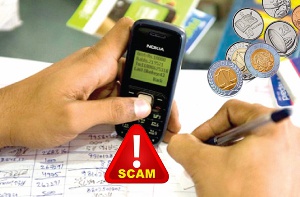Paying bills, shopping, transferring money, checking your bank account – you can save up time and energy by just doing all these things from your phone with mobile money, no matter where you are. But the question is how safe is your money?
There are over 16.4 million mobile money accounts in Ghana with many subscribers on MTN Mobile Money. This is a huge market for scammers also to carry out fraudulent activities. You need to protect your phone and your account’s information from hackers, thieves, and malware.
Here are tips for you.
1. Register with a trusted agent
Whether you are a Tigo cash user, Airtel Money, Vodafone Cash or MTN Mobile Money user, you can be at risk if you don’t register or do transactions with a safe, trusted and an accredited agent. The best option is to register at your nearest mobile money operator’s branch office.
Once registered, learn how to transfer and receive money yourself. Avoid giving your mobile phone to agents or friends when transferring or receiving money. Take total control of your stuff. If you face any problem, your operator’s nearest branch office is the safest place to seek solution.
2. Set PINs and passwords on your phone
Some people feel really uncomfortable setting up passwords to lock their phone or tablet. If you are somebody who is forgetful then this may not be a great solution.
However the best protection against somebody gaining access to your accounts from your phone is by using a device password. This means whenever somebody goes to open your iPhone or Android it will require a passcode before unlocking.
This is a great solution if you are often moving around and traveling with your devices or allowing your friends to use your phone more frequently. Protect your phone/tablet with a strong password and set up a SIM card PIN so that it can’t be used in another device.
Make sure you don’t use the same numbers as your mobile money PIN or ATM PIN. Even better than using a numerical password is to use the “fingerprint” technology that is available on most new smartphones.
Don’t store account log-in details, any passwords or account numbers on your mobile device. Keep them safely stored elsewhere. In fact, don’t store any sensitive personal data on your device. If you’re recycling your phone or passing it on to someone, make sure you delete all such personal information first.
3. Choose your mobile money PINs wisely
When choosing your mobile money PIN, select the numbers at random, memorize it and never disclose it to anyone. Many people use their date of birth, phone number or other IDs (School, work, voter ID etc.) as their PIN and as a result get scammed. Choose a strong PIN that no one can easily guess.
4. Use only your bank’s official app
Banks such as Ecobank, Fidelity Bank, UniBank etc…allow their customers to transfer money from bank accounts to mobile money and vice versa. If you are using any of these banks for this service, verify that a banking app is official before you download and install it.
Additionally, do not download an app anywhere apart from Google Play, IOS or Windows App Store. These are the safest places to download apps for your mobile device. If you have any doubts, check with your bank first. Using your bank’s app avoids the risk of you logging on to fake sites. Also remember to log out of the app or mobile site when you’ve finished.
5. Avoid public (risky) Wi-Fi
Don’t carry out sensitive and financial transactions using public Wi-Fi or unknown networks (Read: Wi-Fi hotspots in Accra). Public connections aren’t very secure — most places that offer a public Wi-Fi hotspot warn users not to share sensitive information over the network.
The open nature of public networks makes them vulnerable – you never know who may be poking around and watching what you’re doing online. Make sure you use a secure connection when making any financial transaction or communicating with your bank.
In addition, any compromised devices or USB keys that are connected to the local network could pass on malware to your mobile or tablet.
You can get around these issues by disabling Wi-Fi on your device and using your cell network instead. It’s good practice anyway to turn off Wi-Fi and Bluetooth when you’re not using them.
6. Beware of fake SMS scammers
Be aware that some scammers send SMS messages purportedly from your bank, or your mobile money operator requesting your personal identification number, or PIN; account number; or other vital information. Any such request for information is almost certainly fraudulent or phishing attempts.
Always tell your bank or your mobile money operators about any suspicious emails or texts you receive. Don’t click on dubious links in emails or text messages. Never send financial information by unencrypted email.
7. Protect your mobile device with security app
Install mobile security app and keep it updated. Don’t forget to install updates for your device operating system and banking app too as they become available. You’re more vulnerable to evolving threats if you have outdated versions of apps on your mobile phone/tablet.
Back up your data so that you can recover it if necessary. If possible, get a theft tracker for your mobile device, so that if it’s lost or stolen you can locate it via GPS (Global Positioning System), remotely lock it and wipe your data.
8. Be wary of unsolicited calls
Be careful when you return a missed call from an unknown number. These could be potentially unwanted and costly schemes, spam and scam voice and text messages. You could be charged premium rates for these calls. The bigger danger is that your phone data might be transferred during the call.
You should also be wary of using apps that help you recognize caller IDs of numbers that are not stored in your mobile device. Never use automatic call acceptance feature as this can be used by cyber crooks to establish a connection without your information.
9. Use social media wisely
Social media platforms have become a major hunting ground for scammers, where users tend to share information voluntarily in a rather lax and informal environment. Never click on posts that you are not sure of or links that can redirect you to a phishing site.
Such links could rob you of your phone address book and other information stored in your mobile phone. Messaging apps, such as those used in group chats, message or update is accessible only for a short period and are then deleted permanently. But, in reality the records remain and fraudsters can hack into these sites and steal your personal information.
mobile money safety tips, secure websites, swiftfoxx, https sitesA secure web sites URL (e.g swiftfoxx) should begin with “https” and not “http“. The “s” stands for secure and uses Secure Sockets Layer connection. Another sign to look for is the “Lock” icon displayed in the browser window.
10. Watch statements and report suspicious activity
If you are ever in doubt about your mobile money accounts being compromised do not hesitate in taking action. You can change your PIN many times over when you feel it’s a good idea. Often times your gut instinct may indeed be correct without having any solid evidence.
Also be sure to log into your mobile money account every so often and make sure there is no suspicious activity. Check for any money transfers or withdrawals which you didn’t authorize.
These 10 good practices are just the first step to take in ensuring the safety of your mobile money. As prevention is better than cure, make sure you’re always up to date with mobile developments, the mobile security risks they pose, and ways to counter them.
Have you ever encountered any problem with your mobile money? Share your experience with us.
Business News of Tuesday, 30 May 2017
Source: swiftfoxx.com
Mobile money safety tips: How to protect your mobile money from scam
Entertainment












